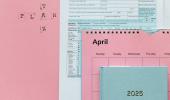Besides wrong selection of ITR form, many professionals claim deductions they are ineligible for.

With the tax filing season underway, professionals should initiate the process early. This will enable them to file timely and accurate tax returns.
Early filing of returns will also help them receive tax refunds sooner.
Choose correct ITR form
Resident professionals opting for the presumptive taxation scheme (PTS) regime under Section 44ADA typically file using ITR-4 (Income Tax Return Form 4).
However, if total income exceeds Rs 50 lakh or includes capital gains (excluding long-term gains under Section 112A up to Rs 1.25 lakh), foreign income or assets, income from multiple house properties, or agricultural income over Rs 5,000, ITR-3 becomes applicable.
"ITR-4 is also inapplicable if the professional is a company director; held unlisted equity shares in the previous year; has brought forward or wants to carry forward loss; has income on which tax has been deducted at source (TDS); or has claimed foreign tax credit on foreign income," says Sanjoli Maheshwari, executive director, Nangia Andersen India.
In all these cases, ITR-3 must be used.
Eligibility for presumptive taxation
PTS under Section 44 ADA applies to resident individuals or partnership firms (excluding LLPs) with annual gross receipts up to Rs 50 lakh, extendable to Rs 75 lakh if cash receipts are within 5 per cent of total gross receipts.
"Under this scheme, 50 per cent of the total gross receipts would be deemed to be profits and gains from the profession and would be taxed accordingly.
"Further, no deduction of expenditure is then allowed under Section 30 to 38 of the Income Tax Act," says Maheshwari.
The scheme is available to a wide range of professionals, including those in legal, medical, engineering, accountancy, consultancy, and other notified services.
Compliance becomes simpler
This scheme simplifies compliance by eliminating the need to maintain detailed books or undergo tax audit, allowing professionals to save time, effort, and expenses on compliance.
"It allows professionals to avoid the need for complex calculations of actual expenses, depreciation, and so on," says Maheshwari.
Not for professionals with low margins
The scheme has certain limitations. LLPs and non-resident assessees cannot avail of it, nor can professionals with gross receipts exceeding Rs 50 lakh (Rs 75 lakh under specified conditions) in a financial year.
"Professionals with high expenses and low profit margins will find PTS less beneficial, as they would incur a higher tax liability than under the regular method, which permits deduction of actual expenditures incurred," says Maheshwari.
Another drawback of PTS is that since actual expenses are not allowed to be deducted, the actual business loss incurred during the year will also not be allowed to be carried forward to future years, according to Maheshwari.
Opting out and re-entry
Professionals can re-enter the presumptive regime under Section 44ADA without restriction.
They should, therefore, track their actual expenses to assess whether PTS or the regular scheme results in a lower tax liability.
Claiming deductions
Professionals using the regular provisions may claim business-related expenses under 'profits and gains of business or profession'.
"These include rent for the workspace, communication expenses, travel and conveyance expenses, professional development expenses, employee's salary, depreciation, repairs and maintenance, insurance premium, and legal and professional fees paid," says Preeti Sharma, partner, global employer services, tax & regulatory services, BDO India.
Home office expenses can be claimed if part of the residence is used exclusively for work.
"The space should be used exclusively for business or professional activities.
"Expenses (like rent, electricity, Internet, etc) should be directly related to the profession. Proper records and proofs (like bills and rent agreements) should be maintained. Only proportionate part of shared expenses should be claimed," says Abhishek Soni, co-founder, Tax2Win.
Mistakes to avoid
Besides wrong selection of ITR form, many professionals claim deductions they are ineligible for.
"Many also fail to file their returns by the due date. Other common errors include not disclosing full income, and failure to pay advance tax," says Soni.
Different provisions of PTS are applicable to business owners and professionals.
"Some professionals may opt for PTS provisions applicable to business owners, which could lead to litigation and financial penalties," says Sharma.
Those who maintain a home office must be careful about how professional and personal expenses are divided.
"In the absence of proper documentation, the risk that the expenses may be disallowed during audit proceedings is high," says Sharma.
Be aware of penalties
Selecting the wrong ITR form can have consequences.
"The return will be treated as defective under Section 139(9), which can result in notices or the return being invalidated," says Sharma.
Misreporting and under-reporting can result in penalties ranging from 50 to 200 per cent of the tax payable.
Soni explains that the severity of penalties depends on whether the under-reporting was deliberate or due to oversight or negligence.
He adds that to avoid penalties, taxpayers should correct errors by filing a revised or updated ITR.
Disclaimer: This article is meant for information purposes only. This article and information do not constitute a distribution, an endorsement, an investment advice, an offer to buy or sell or the solicitation of an offer to buy or sell any securities/schemes or any other financial products/investment products mentioned in this article to influence the opinion or behaviour of the investors/recipients.
Any use of the information/any investment and investment related decisions of the investors/recipients are at their sole discretion and risk. Any advice herein is made on a general basis and does not take into account the specific investment objectives of the specific person or group of persons. Opinions expressed herein are subject to change without notice.
Feature Presentation: Ashish Narsale/Rediff











